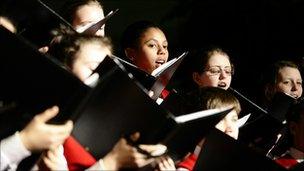Singing your heart out this Christmas is good for you
- Published

Whether it's a candle-lit carol service or a rather more raucous evening of karaoke down the pub, many people will enjoy a good old singsong this Christmas.
But belting out "Hark! the herald angels sing" or your own unique interpretation of "I will survive" will not just lift the spirits - it's good for your physical health as well.
It may not feel like it, but singing is a form of exercise, albeit rather gentle.
Filing the lungs with air, increasing the heart rate and getting blood pumping round the body faster can all help our physical health.
For the past few years Heart Research UK has been running a Christmas campaign aimed at getting people singing, simply for the benefit it can bring.
The charity's Barbara Dinsdale says singing is a safe, simple and social activity that everyone can enjoy.
"As it's an aerobic activity singing improves heart health with related benefits to overall health and is linked to longevity, stress reduction, and general health maintenance.
"Singing also brings a great amount of happiness. It is impossible to sing well with a long face because it affects your pitch. Keeping the positive momentum up is essential. If we smile as we sing then people soon feel the benefit in more ways than one."
There is also the adrenalin kick brought on by a performance - a sensation familiar to both professional opera singers and even anyone brave enough to step up to the microphone to sing in front of their friends in the pub.
The human body-mind
But why does it feel so good to let rip on a classic carol or power ballad?
Professor Graham Welch, who leads the International Music Education Research Centre at the University of London, has spent more than 30 years studying the effects of singing.
He says it's to do with the way the body is an integrated system, sometimes called the human body-mind, linking the nervous, endocrine and immune systems.
"The physical, mental and emotional - these three things are interwoven.
"Because music is multi-sited in the brain and we're also involving ourselves in strong aerobic activity and singing is a form of exercise, it means there's a release of what's called the pleasure hormone.
"But when we sing we also see a measurable decrease in stress hormones like cortisol - a direct correlation in the physical endocrine system."
And communal singing - like in a choir, a church service or even a singsong in the pub - helps boost our sense of self-esteem.
"It relates to our communal pleasure as well, it increases our sense of satisfaction with ourselves, a greater sense of feeling included."
That heightened sense of well-being is something that singing teacher Helen Astrid has seen first hand.
She says when people leave their singing lessons they do so with a spring in their step, feeling like they have really achieved something.
But why do we get that hair-on-the-back-of-the-neck feeling, the rush of excitement, when we hear a room full of people launch into a well known song or carol?
"It's about having the opportunity to really let go and hear other voices come at you from left, right and centre.
"It lifts us up on a spiritual level, it helps our self-esteem, and it's great for all ages from toddlers to grannies - you can have a good sing and let your hair down."
Dutch courage
And her advice for the casual, once a year caroller?
"Sing out rather than hold back. Let go and don't worry about the soprano parts - leave that to the choir."
But one word of warning from the professional coach is to not indulge in too much Dutch courage before taking to the stage - or even turning up at midnight mass after an evening in the local pub.
"Don't have too many beers or glasses of wine, although a glass of port is meant to be good for the voice - possibly because it helps us lose our inhibitions a little."
- Published10 September 2010
- Published22 July 2010
- Published20 November 2005